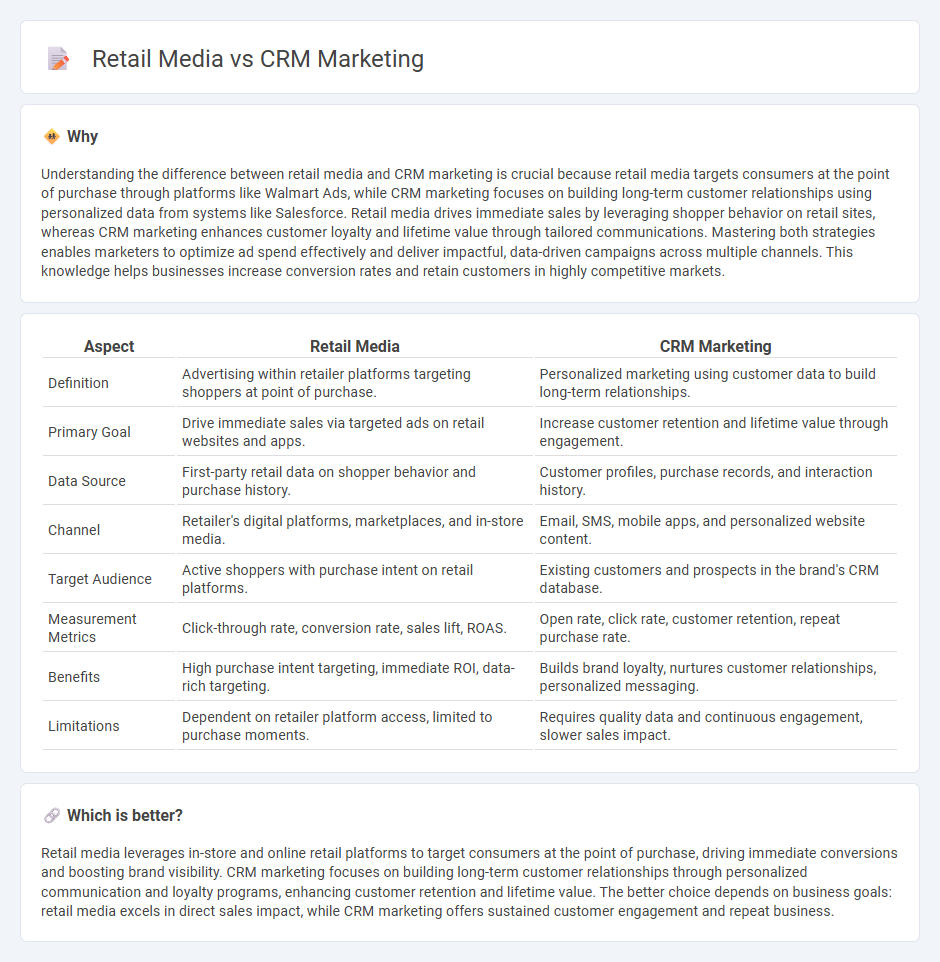
Retail media leverages shopper data and e-commerce platforms to deliver targeted ads at the point of purchase, driving immediate sales and brand visibility. CRM marketing focuses on building long-term customer relationships through personalized communication, enhancing customer loyalty and lifetime value. Explore deeper insights into retail media and CRM marketing strategies to accelerate business growth.
Why it is important
Understanding the difference between retail media and CRM marketing is crucial because retail media targets consumers at the point of purchase through platforms like Walmart Ads, while CRM marketing focuses on building long-term customer relationships using personalized data from systems like Salesforce. Retail media drives immediate sales by leveraging shopper behavior on retail sites, whereas CRM marketing enhances customer loyalty and lifetime value through tailored communications. Mastering both strategies enables marketers to optimize ad spend effectively and deliver impactful, data-driven campaigns across multiple channels. This knowledge helps businesses increase conversion rates and retain customers in highly competitive markets.
Comparison Table
| Aspect | Retail Media | CRM Marketing |
|---|---|---|
| Definition | Advertising within retailer platforms targeting shoppers at point of purchase. | Personalized marketing using customer data to build long-term relationships. |
| Primary Goal | Drive immediate sales via targeted ads on retail websites and apps. | Increase customer retention and lifetime value through engagement. |
| Data Source | First-party retail data on shopper behavior and purchase history. | Customer profiles, purchase records, and interaction history. |
| Channel | Retailer's digital platforms, marketplaces, and in-store media. | Email, SMS, mobile apps, and personalized website content. |
| Target Audience | Active shoppers with purchase intent on retail platforms. | Existing customers and prospects in the brand's CRM database. |
| Measurement Metrics | Click-through rate, conversion rate, sales lift, ROAS. | Open rate, click rate, customer retention, repeat purchase rate. |
| Benefits | High purchase intent targeting, immediate ROI, data-rich targeting. | Builds brand loyalty, nurtures customer relationships, personalized messaging. |
| Limitations | Dependent on retailer platform access, limited to purchase moments. | Requires quality data and continuous engagement, slower sales impact. |
Which is better?
Retail media leverages in-store and online retail platforms to target consumers at the point of purchase, driving immediate conversions and boosting brand visibility. CRM marketing focuses on building long-term customer relationships through personalized communication and loyalty programs, enhancing customer retention and lifetime value. The better choice depends on business goals: retail media excels in direct sales impact, while CRM marketing offers sustained customer engagement and repeat business.
Connection
Retail media and CRM marketing are connected through their shared goal of delivering personalized customer experiences by leveraging data insights. Retail media platforms utilize transaction and behavioral data collected from CRM systems to create targeted advertising campaigns, enhancing customer engagement and driving sales. Integrating CRM marketing data with retail media enables brands to optimize audience segmentation, improve campaign performance, and measure return on investment more effectively.
Key Terms
CRM Marketing:
CRM marketing leverages customer data to create personalized campaigns that enhance customer retention and increase lifetime value by targeting specific segments with tailored offers. Retail media, by contrast, centers on advertising directly within retail platforms to drive immediate sales through product visibility and promotions. Explore our insights to discover how CRM marketing can transform your customer engagement strategies.
Customer Segmentation
CRM marketing leverages detailed customer segmentation by utilizing first-party data to create personalized campaigns that enhance customer retention and lifetime value. Retail media focuses on segmenting customers through purchase behaviors captured via retail platforms, optimizing ad targeting to drive immediate sales conversions. Explore more to understand how these segmentation strategies can transform your marketing approach.
Personalization
CRM marketing leverages customer data to create highly personalized campaigns targeting individual preferences and purchase history, enhancing customer loyalty and lifetime value. Retail media utilizes first-party data within retail platforms to deliver personalized ads at the point of purchase, driving immediate sales and improving ROI for brands. Discover how integrating CRM marketing with retail media can elevate your personalization strategy and maximize revenue.
Source and External Links
CRM marketing 101: Definition, benefits, and powerful strategies - CRM marketing uses CRM software and data-driven techniques to personalize, automate, and optimize campaign management, improving customer engagement, retention, and revenue growth.
CRM Marketing - Definition & Strategy - CRM marketing employs customer data to create personalized campaigns such as email marketing, cross-sell, upsell, and event-triggered messages aimed at boosting engagement, loyalty, and retention.
CRM Marketing Definition + Best Marketing CRM Tools - CRM marketing automation streamlines marketing tasks and campaigns by collecting data, segmenting customers, automating personalized outreach, and continuously optimizing for better performance.
 dowidth.com
dowidth.com